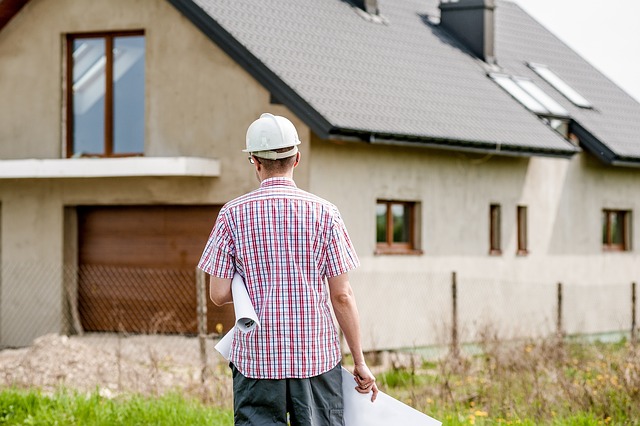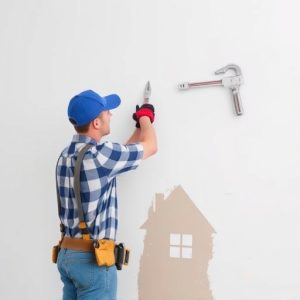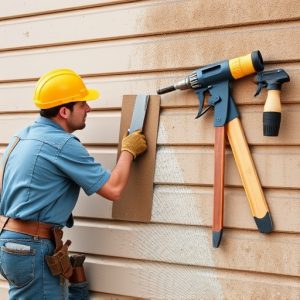Avoiding Common Pitfalls: Expert Handyman Tips for Flawless Home Repairs
Handymen must conduct thorough project scoping to ensure success, avoiding oversights that could le…….

Handymen must conduct thorough project scoping to ensure success, avoiding oversights that could lead to additional costs or complications post-initiation. A detailed inspection allows for an effective action plan, considering current needs and potential challenges during the repair process. Efficient planning, including resource allocation for time, materials, and tools, is essential for high-quality repairs that meet customer expectations and save time while minimizing waste. Safety is a top priority in home repair; handymen must adhere to safety protocols, wear protective gear, and understand tool usage to prevent accidents and comply with regulations. Legal compliance is non-negotiable when dealing with complex tasks like working at heights or using heavy machinery. Securing necessary permits is crucial to avoid legal issues and financial penalties. Precision in estimating material quantities and selecting durable materials is vital for project longevity and to prevent setbacks. Meticulous planning, adaptability, and a well-equipped toolkit are key to overcoming unforeseen complications and cost overruns. Handymen should perform comprehensive testing on electrical, plumbing, and HVAC systems post-repair to ensure functionality, safety, and energy efficiency, thereby preventing future problems and expenses. Adhering to handyman tips across these areas underpins successful project outcomes and long-term home maintenance.
Embarking on a DIY home repair project or employing a handyman can transform your living space. However, to ensure successful outcomes and maintain safety and compliance, it’s crucial to sidestep common pitfalls. This article outlines key handyman tips across six essential areas: accurately assessing the extent of repairs, adhering to safety protocols, securing necessary permits, managing materials effectively, incorporating flexibility into your planning, and testing systems post-repair for optimal functionality. By heeding these guidelines, you’ll enhance the longevity and quality of your handyman work, ultimately safeguarding both your home and investment.
- Understanding the Scope of Repairs: The Importance of Thorough Assessment
- Overlooking Safety Precautions: Protecting Yourself and Your Property
- Skipping the Necessary Permits: Legal Implications for Handymen
- Misjudging Material Quantities and Quality: Ensuring Proper Supply Management
- Failing to Plan for Contingencies: The Role of Flexibility in Handyman Work
- Neglecting to Test Systems After Repairs: Electrical, Plumbing, and HVAC Integrity Verification
Understanding the Scope of Repairs: The Importance of Thorough Assessment

When embarking on repair projects, a handyman must have a clear understanding of the scope of work required to achieve successful outcomes. This involves conducting a thorough assessment before any work begins. A meticulous evaluation ensures that all necessary tasks are identified, preventing oversights that could lead to additional costs and complications later on. Handyman tips often emphasize the importance of this initial step, as it sets the foundation for a well-executed project. By carefully inspecting the area and understanding what needs to be done, a handyman can create a detailed plan of action. This includes not only the tasks at hand but also considering potential issues that may arise during the repair process. Planning ahead for these contingencies is crucial for maintaining efficiency and effectiveness throughout the project. Accurate scoping allows for better resource allocation, including time management, material procurement, and tool preparation, all of which contribute to a smoother execution and a more satisfactory end result. Consequently, taking the time to fully assess the situation upfront can save time, reduce waste, and enhance customer satisfaction by delivering high-quality repairs that meet their expectations.
Overlooking Safety Precautions: Protecting Yourself and Your Property

When engaging in home repair or improvement projects, handymen often focus on achieving the desired outcome in terms of aesthetics and functionality. However, overlooking safety precautions can lead to costly mistakes and even personal injury. It’s imperative for handymen to prioritize safety measures to protect both themselves and the property they are working on. This includes donning appropriate protective gear such as safety goggles, gloves, and steel-toed shoes when necessary, understanding the proper use of tools and equipment, and ensuring that work areas are free from hazards like exposed wires or loose materials. Additionally, handymen should always read and adhere to manufacturers’ guidelines for any tools or materials they are unfamiliar with. Safety precautions also extend to handling chemicals, working at heights, or operating heavy machinery; proper training and adherence to safety protocols are essential in these scenarios. By implementing these handyman tips, professionals can significantly reduce the risk of accidents and ensure successful outcomes for their projects.
Handymen often underestimate the importance of safety in the midst of their tasks, but this can lead to serious complications. It’s not just about following general guidelines; it’s about understanding the specific risks associated with each job. For instance, when working with power tools, ensuring that they are in good working order and that circuits are not overloaded is crucial. Similarly, when climbing ladders or working on roofs, handymen must assess the stability of the structure and use fall protection where necessary. Good safety practices also involve proper waste disposal to avoid environmental hazards and ensure compliance with local regulations. By incorporating these handyman tips into their routine, professionals can foster a safer environment for themselves and clients, leading to more successful project completions and long-term trust.
Skipping the Necessary Permits: Legal Implications for Handymen

When embarking on home improvement projects, handymen often encounter a variety of tasks that can range from simple repairs to more complex renovations. A common pitfall many face is the oversight of obtaining the necessary permits before beginning work. This omission can lead to significant legal complications and financial repercussions. Local building codes and regulations are in place to ensure safety, quality, and compliance with municipal standards. Ignoring these requirements by skipping the permitting process can result in fines, cease-and-desist orders, or even necessitate the dismantling of completed work, which can be costly and time-consuming to rectify. Handymen should familiarize themselves with local regulations and understand that acquiring permits is a crucial step in safeguarding their business and reputation. It demonstrates professionalism and adherence to legal requirements, thereby fostering trust among clients. In some cases, homeowners may not realize the importance of permits either; therefore, it’s essential for handymen to educate their clients on the significance of this step to avoid future complications. By adhering to handyman tips that include due diligence in permit acquisition, professionals can enhance their service delivery and ensure successful outcomes for all parties involved. This proactive approach not only mitigates legal risks but also contributes to a reputation for quality, reliability, and trustworthiness within the community.
Misjudging Material Quantities and Quality: Ensuring Proper Supply Management

When embarking on a home improvement project, a handyman must carefully assess material quantities and qualities to guarantee project success. Miscalculations in the amount of materials required can lead to costly delays or incomplete work. It’s imperative to measure accurately and account for waste when ordering supplies; this approach ensures that no trip back to the hardware store is necessary mid-project. Additionally, opting for inferior materials might result in substandard repairs or renovations that won’t withstand regular use or environmental factors. Handymen should prioritize investing in durable and high-quality materials that align with the intended lifespan of the project. This foresight not only contributes to a more robust end product but also saves time and resources in the long run, avoiding the need for hasty repairs or premature replacements due to poor material choices. Handyman Tips emphasize meticulous planning and quality-focused execution, both of which are critical in avoiding these common pitfalls. By adhering to these principles, handymen can enhance their craftsmanship, ensuring customer satisfaction and a well-executed home improvement endeavor.
Failing to Plan for Contingencies: The Role of Flexibility in Handyman Work

When embarking on handyman projects, failing to plan for contingencies can lead to unexpected complications and additional costs. A seasoned handyman knows that flexibility is key; not all repairs go as planned, and adaptability can mean the difference between a job well done and one fraught with challenges. To mitigate potential issues, it’s crucial to assess the scope of work thoroughly before beginning. This includes anticipating what might go wrong and having a plan in place for such eventualities. Handyman tips often emphasize the importance of having a well-stocked toolkit and a selection of spare parts on hand. By preparing for various outcomes, a handyman can navigate projects with confidence, ensuring that each task is completed efficiently and effectively. It’s not just about having the right tools; it’s about using them wisely to accommodate the unpredictable nature of home repairs and maintenance. With careful planning and an open mind, handymen can avoid common pitfalls and deliver successful outcomes time and again. Always remember to consider potential contingencies in your project planning to maintain flexibility throughout the job. This approach not only saves time but also contributes to a more professional and satisfying result.
Neglecting to Test Systems After Repairs: Electrical, Plumbing, and HVAC Integrity Verification

When a handyman repairs or installs fixtures within your home, it’s imperative that they conduct thorough tests on the systems they’ve worked on, particularly in the realms of electrical, plumbing, and HVAC. Electrical systems should be meticulously checked to ensure there are no loose connections or potential fire hazards. A seemingly minor repair can disrupt the integrity of an entire circuit if not properly reconnected. Similarly, after any plumbing work, it’s crucial to test for leaks and water flow to prevent undetected moisture issues that could lead to mold growth or structural damage. Handyman tips often emphasize the importance of verifying functionality post-repair; this is especially true for plumbing repairs where water pressure and pipe integrity must be confirmed. Lastly, HVAC systems require a final check to guarantee they’re operating efficiently and at the correct temperature settings. A handyman should ensure that all components, from the thermostat to the air filters, are functioning as intended to maintain energy efficiency and comfort within your home. Neglecting these tests can lead to further complications and additional costs, making it a critical step in any repair process. Always engage a handyman who prioritizes system testing as part of their service to avoid potential issues down the line.
when undertaking handyman tasks, vigilance and preparation are key. This article has highlighted common pitfalls that can derail a project, such as misjudging the extent of repairs needed, disregarding safety measures, bypassing legal permits, and underestimating material requirements. To ensure successful outcomes, it’s crucial to conduct thorough assessments before starting, adhere strictly to safety protocols, obtain the necessary permits, manage supplies wisely, and always test systems post-repair. By heeding these handyman tips, you can sidestep these mistakes and achieve the desired results with greater confidence and efficiency. Remember, a job done right is the best investment in your home’s longevity and your well-being.







